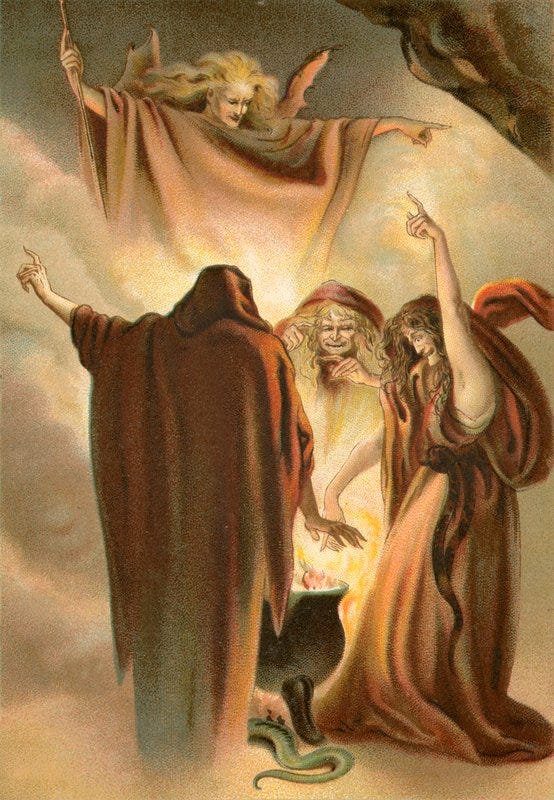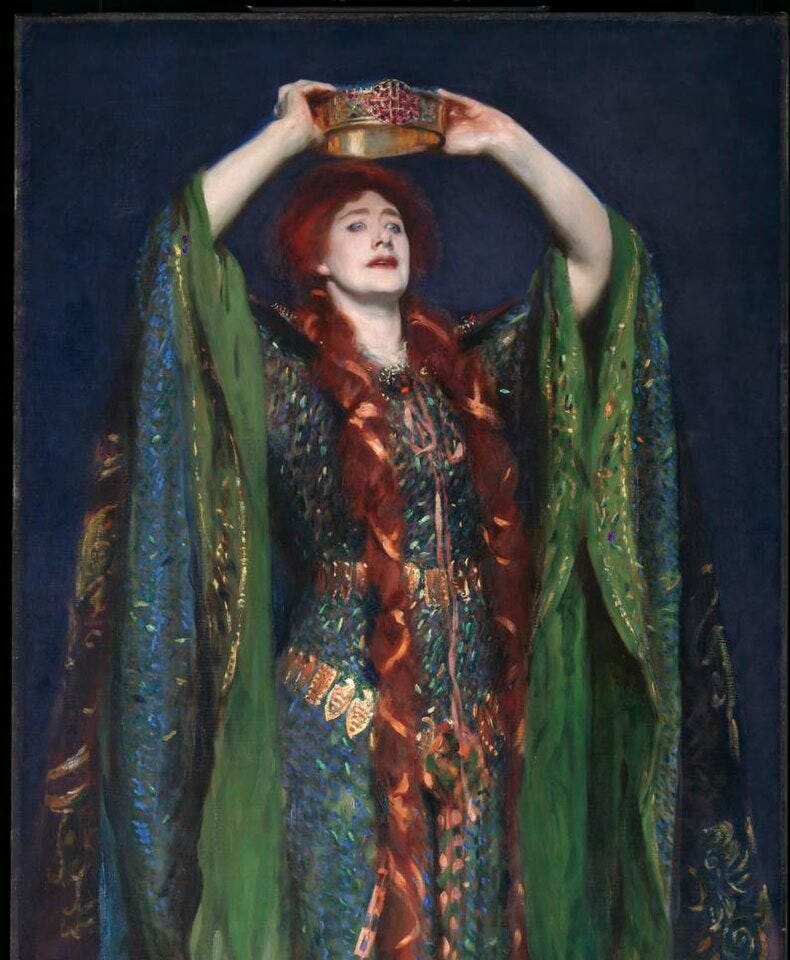Lady Macbeth's Deal with the Devil
Exploring the Spiritual Horror of a Tyrant's Unchecked Ambitions
Few writers capture the darkness of the human soul like Shakespeare. Across his comedies and tragedies, he dramatizes evils so complex that they pierce the deepest recesses of the heart.
Yet among Shakespeare’s cast of villains, Lady Macbeth stands out as especially depraved.
Her bloodlust doesn’t just lead to betrayal, murder, and agony — it calls upon the demonic itself.
Her ambitions extend beyond mere power, and hearken back to an evil that is literally Satanic in its nature.
Here then is the terror behind Lady Macbeth’s desires, and what her depravity teaches us about the spiritual roots of human evil…
Reminder:
Subscribe to support my mission of restoring Truth, Beauty, Goodness, and God to the heart of the West!
A Cruel Ambition
As a recap, the play Macbeth follows the infamous rise and fall of protagonist protagonist Macbeth — a Scottish nobleman who murders his king to seize the throne.
Though as hinted at, Macbeth is not the worst villain of this play.
His wife — Lady Macbeth — proves far more complex, interesting, and sinister in her ambitions.
For instance, she goads her husband to commit the murder after Macbeth balks at the task:
"Hie thee hither, That I may pour my spirits in thine ear;
And chastise with the valour of my tongue
All that impedes thee from the golden round"
Notice how Lady Macbeth helps corrupt her husband by “pouring her spirits in thine ear.”
One can’t help but notice the imagery of a Serpentine whisper. Indeed, Lady Macbeth’s soul itself seems to carry an abscess of darkness.
Where did such corruption come from?
Lady Macbeth will show us the roots of her evil itself…
Praying to the Demonic
Lady Macbeth’s evil takes its roots in treachery and deceit.
She dons the outward appearance as a genteel and courteous host to King Duncan, repressing her wickedness to her private life, and tells her husband to do the same:
"Look like th' innocent flower, But be the serpent under 't"
Again, Lady Macbeth invokes an image of a serpent sowing lies. As the poet Dante would suggest, her crimes are worse than murder, because her corruption has its roots in deceit. She’s a liar above all things, and lying perverts the intellect, which is the highest good of the soul.
Once again, the reference to the Satanic grows — you fall into the greatest evil by corrupting the greatest good in your being.
Lady Macbeth will take this perversion to its utmost extreme…
An hour before Macbeth commits the initial murder, Lady Macbeth retreats to her room in private.
Alone, she whispers a demonic prayer to the underworld, asking spirits to corrupt the most sacred aspect of her being:
"Come, you spirits
That tend on mortal thoughts, unsex me here,
And fill me from the crown to the toe top-full
Of direst cruelty! Make thick my blood;
Stop up the access and passage to remorse...
Come to my woman's breasts,
And take my milk for gall"
On the surface, Lady Macbeth is asking for the strength to go through with her murderous plot, but there’s something even darker happening here.
It has to do with this phrase:
“Unsex me here”
Lady Macbeth is not just asking for power — she’s asking the demonic to corrupt her womanhood itself.
This is not because her womanhood is a weakness, rather it’s a request to destroy the most sacred, beautiful, and noblest part of her being — her maternal instinct.
Classically, female nature is tied to life, nurture, and the moral order.
The Virgin Mary’s, “yes” to birth Christ is emblematic:
Womanhood not only brings forth new life, but its very vocation affirms that life is good, for it was a woman who bore the Good made flesh.
Yet Lady Macbeth seeks more than just destruction — she wants to be “filled with direst cruelty.”
In other words, she is corrupting her maternal instinct by filling her womb with spiritual evils. She doesn’t give a Marian “yes,” but a Luciferian “no.”
She seeks to give birth to an “anti-logos,” that denies the moral order altogether.
As such, Lady Macbeth embraces the wicked moral code of the play’s evil witches:
“Fair is foul and foul is fair.”
Unfortunately, Lady Macbeth will discover that when you pray to destroy your own nature, what answers you back is an evil beyond comprehension. In fact, it’s an evil so ancient it hearkens back to the Garden of Eden itself…





